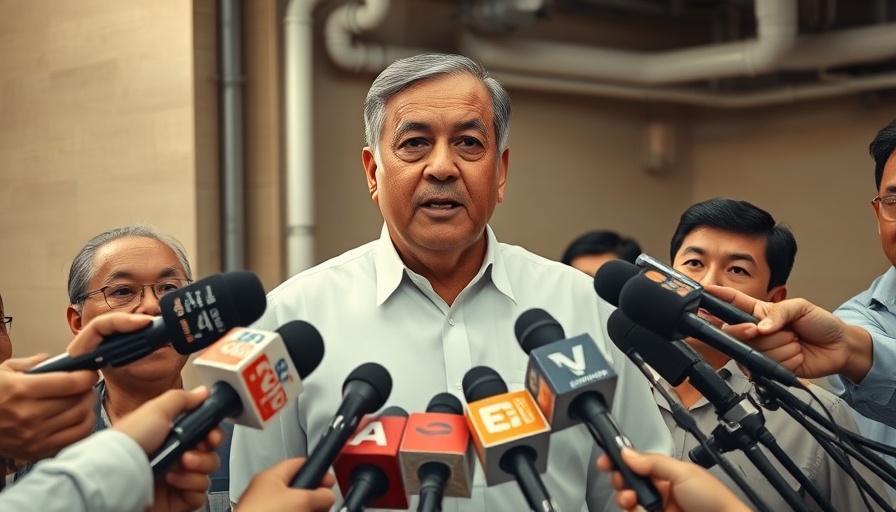
The Heart of the Budget Debate: Fitzpatrick's Courage to Stand Alone
U.S. Rep. Brian Fitzpatrick of Pennsylvania has garnered national attention as the only Republican from the state to oppose President Donald Trump’s recent budget bill. While many Republicans rallied behind a plan that imposes significant cuts to safety nets like Medicaid, Fitzpatrick stood firm against a measure he believed jeopardized essential services for vulnerable communities.
This budget bill, passed largely along party lines, aims to advance several of Trump's domestic policy priorities, including tax cuts and increased defense spending. However, it projects to add more than $3 trillion to the national debt over the next decade, exposing a deep divide within the Republican Party itself. As concerns grow over fiscal responsibility, Fitzpatrick's vote stands out in stark contrast to a party increasingly willing to sacrifice community well-being for political gains.
Why Fitzpatrick's Opposition Matters: Medicaid Cuts at the Forefront
Fitzpatrick's concerns were primarily centered around proposed amendments that would deepen cuts to Medicaid. "I voted to strengthen Medicaid protections," he stated, emphasizing his initial support for earlier versions of the bill that lacked these drastic cuts. His opposition reflects a temperate approach amid the often polarizing landscape of American politics, particularly regarding budgetary commitments to social welfare.
Many supporters of the budget countered Fitzpatrick's stance by claiming the measures would bring substantial tax relief to working-class families. They argue that recent changes would help crack down on instances of fraud and abuse within the Medicaid system. However, analysis from the Kaiser Family Foundation highlights a crucial point: 92% of Medicaid recipients under 65 are actively engaged in work, school, or caregiving. This data calls into question arguments that position cuts as a necessity for fiscal viability.
Voices from Across the Divide: Perspectives on the Budget Bill
The budget discourse is not firmly black and white, with opinions reflecting various regional interests. For instance, Rob Bresnahan, a fellow Republican representing Northeast Pennsylvania, praised the budget for delivering the largest tax cuts in American history while assuring constituents of added Medicaid protections. His assertion starkly contrasts with Fitzpatrick's view, emphasizing how different areas perceive the implications of the budget bill based on local economic conditions.
This budget battle showcases the potential for division not only among party lines but also within districts. Concerns about cuts to Medicaid and other safety programs resonate strongly in areas that rely heavily on federal support for healthcare and social services.
Understanding the Broader Implications: A Path Forward for Republicans?
The challenge for the Republican Party is finding common ground. As seen through Fitzpatrick's opposition, there are factions within the party that advocate for responsible governance that doesn't compromise community welfare. This suggests a potential reevaluation of what it means to be a Republican representative in an era defined by stark ideological divides.
Could Fitzpatrick's courage inspire others in the party to adopt a similarly compromised approach? As fiscal responsibility gains importance, it may be time for leaders to embrace opposing views and work towards a budget that truly benefits all constituents.
The Future of Medicaid and Social Services: What's at Stake?
Looking ahead, it's essential for policymakers to consider the implications of these budget decisions not just on finances, but on real lives affected by these cuts. Vulnerable populations, including the elderly and those with disabilities, stand to lose crucial support systems if drastic cuts are implemented. This should be a pivotal moment of reflection for legislators about their commitments to their constituents and the broader societal impact of their decisions.
With economic realities changing rapidly, voters will likely keep a closer eye on representatives like Fitzpatrick who blend moderate approaches with principled stances. They may see his actions as emblematic of a needed pivot towards policies that prioritize the needs of Pennsylvanians rather than mere political gains.
Call to Action: Engage with Your Representatives
As residents of Pennsylvania, staying informed about these budget discussions is crucial. Engaging with your local representatives about issues that matter, including Medicaid and social services, can lead to changes that positively affect our communities. Don't hesitate to reach out and express your views—your voice can shape the future priorities of our elected officials.
 Add Row
Add Row  Add
Add 




 Add Row
Add Row  Add
Add 

Write A Comment